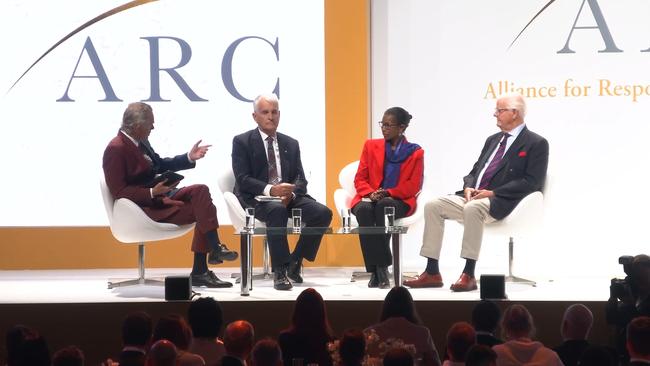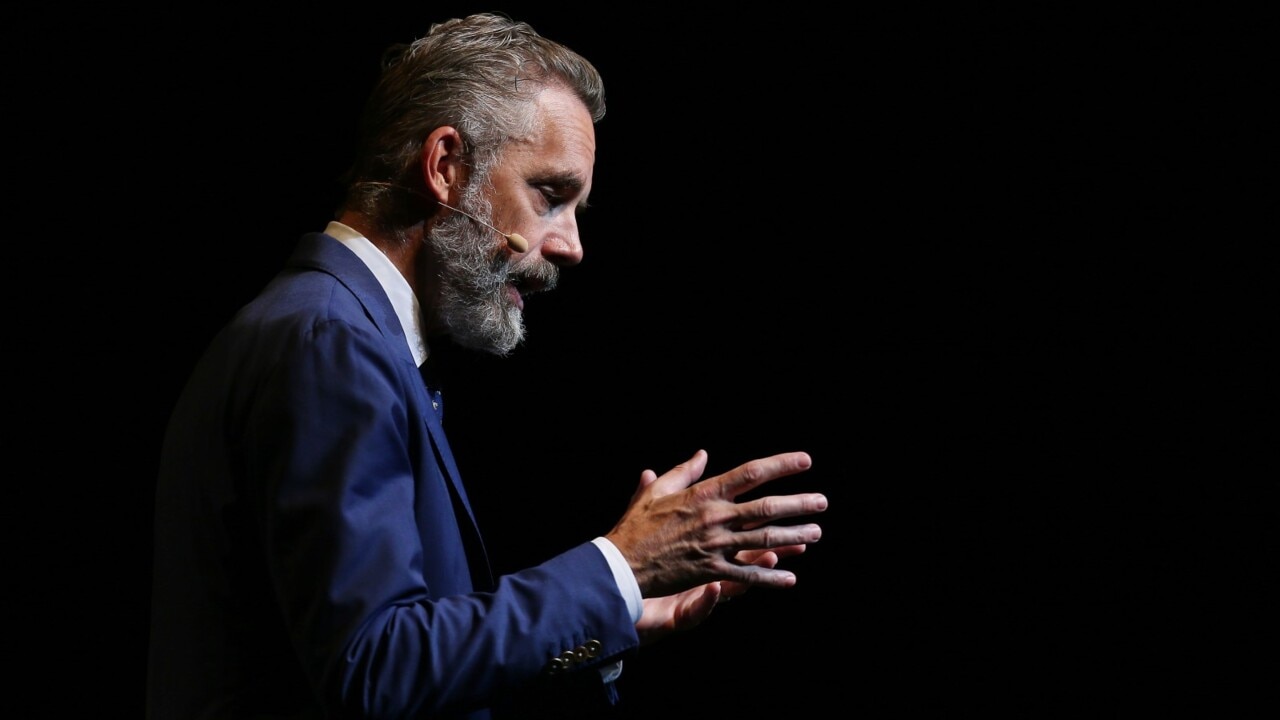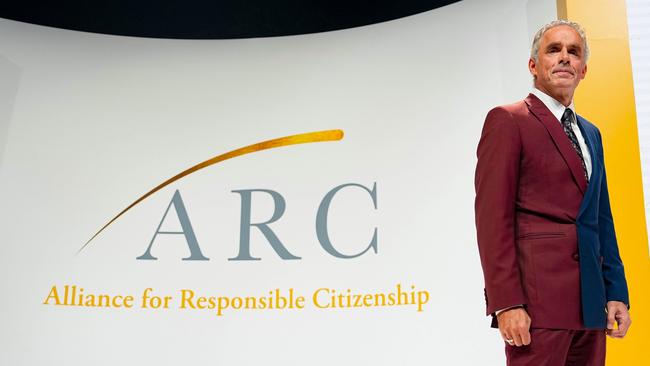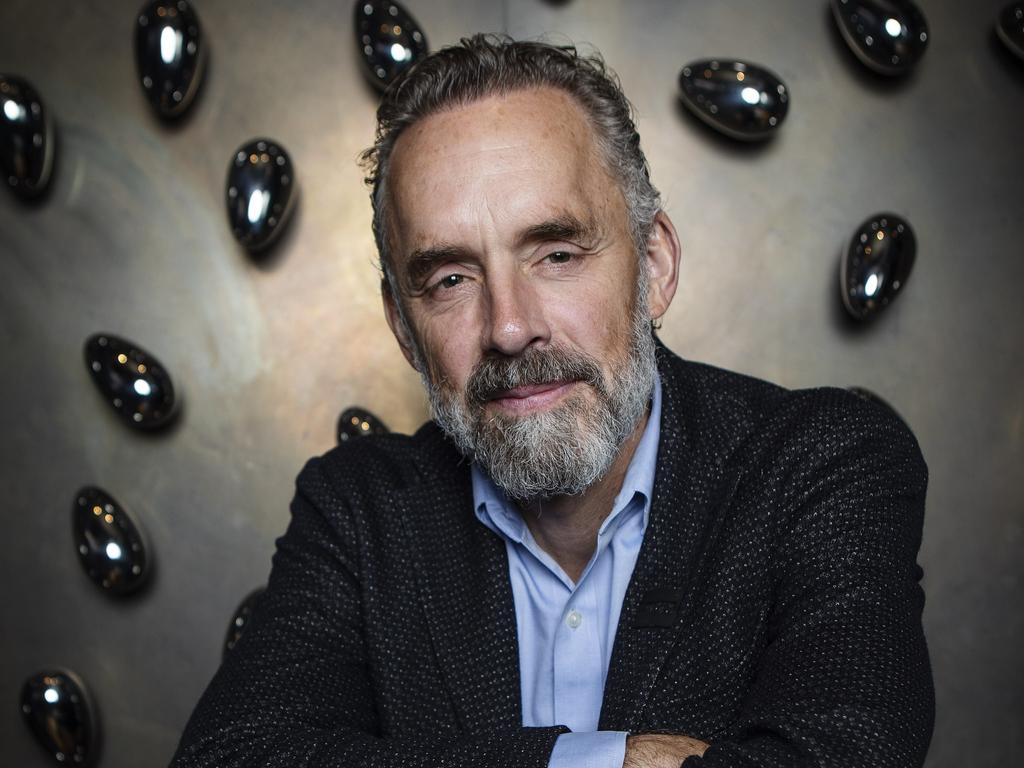Jordan Peterson’s Christian revelation rewrites Western culture and politics
Jordan Peterson is, after all, a believing Christian. It is, perhaps, the most striking thing I learn in a long discussion at one of the most remarkable and distinctive conferences I’ve attended.

ARC, which was Peterson’s brain child and was organised by former Australian deputy prime minister John Anderson and British Baroness Philippa Stroud, could end up a global turning point in centre-right and conservative politics. But ARC was more than just politics and more than just conservative, for there were some politicians there from centre-left parties. It was also about culture, integrity, optimism.
US House of Representatives Speaker Mike Johnson and past Speaker Kevin McCarthy spoke in strident defence of Western civilisation. McCarthy hit a few obvious Republican Party talking points.

Not everyone sang from the same song sheet, however. The Liberals’ Andrew Hastie disagreed with McCarthy’s old refrain that government was the problem. No, Hastie said, government, even big government, isn’t the problem. The problem is bad government. Part of the solution is good government. This is especially the case in national security.
ARC speakers, government ministers, academics, celebrities – US presidential candidate Vivek Ramaswamy, TV celebrity doctor and failed Senate candidate Mehmet Oz – authors such as Tom Holland, Jonathan Haidt and Danny Kruger, British politicians Michael Gove and Kemi Badenoch, as well as social analysts such as Warren Farrell and Louise Perry, reported crisis aplenty.
But they also saw the green shoots of growth in their own movements, a sense that the public was fed up with the elites patronising them, with the social engineering that ruins their kids’ schooling and the anti-Western dispositions in higher education that lead to cancel culture, anti-Semitism and a hatred of the Western tradition that is, simultaneously, irrationally intense and deeply ignorant.
Unusually for an international political conference, ARC celebrated Christianity a good deal, both as the source and inspiration of much Western culture, but also in its own right. A surprise star was US Catholic Bishop Robert Barron, perhaps the most successful television evangelist of our age, a kind of calmer version of Peterson but in a Roman collar and in explicit service to a contemporary expression of eternal truths.
Barron linked the cultural crisis of today to a misunderstanding of the purpose and meaning of freedom. This derived, he explained, over several hundred years from a medieval theological debate about whether freedom was designed to serve goodness or purely to serve choice. Unrestricted choice, without a sense of the purposes of choice, leads to a culture that is dull, incoherent and dangerous.
British Conservative MP Miriam Cates shocked the 1500 delegates – the conference was sold out long in advance – by telling them most British infants school teachers have confronted children coming to school in nappies because they’ve never been properly toilet trained. This is not preschool but infants’ school. Can this possibly be true? Has a Western society, swathed in historically unprecedented affluence, failed even in the most elementary tasks of passing on civilisation? She was one of several powerful presenters who focused on the mess the West is making in much early childhood development.
The traditional family, the virtue and joy of having children, received the kind of heavyweight intellectual support that has been almost completely absent, virtually a thought crime, in Western political discourse for decades.
Another surprise star was Scottish National Party politician Kate Forbes, who was viciously opposed and defamed because, when she ran for the SNP leadership earlier this year, she was a practising Christian with traditional views on marriage and transgender issues. Though she accepted her party’s policy on all matters, it was regarded as intolerable in a centre-left party that she should think marriage happens between a man and a woman, or even that she said she would not have an abortion.
As a Christian politician, Forbes deliberately chose not to duck questions like this. She had no plans to impose her views on anyone but, somewhat like the Islander background Manly-Warringah rugby league players who chose not to wear a gay pride jersey, she declined to celebrate views with which she disagreed. Tolerance was not enough and there was no place for conscience. Yet her support among the Scottish public was high and she eventually lost her leadership bid by a narrow 52-48.
Except for one session, the ARC conference didn’t focus on geostrategic issues but there was pervasive support for Israel.
The conference was preposterously full of razzamatazz, with myriad showbiz touches, something you’d never expect at an international conservative gathering. There was high-class music, Hollywood producers and film extracts, slick videos, the walls adorned with conservative aphorisms, such as Bob Dylan’s “Freedom just around the corner for you, but with the truth so far off, what good will it do?”
The networking was jovial and intense. And there were lots and lots of young people. This had all the feeling of a movement with momentum. Watch out, woke, there’s a different spirit abroad.

But Peterson’s presence was the extra electric extra, the spark. On the final night of the conference he held a characteristic public performance at the Millennium Dome, where he talked to 20,000 people for a few hours and ended: “Aim up!”
The Canadian psychologist, author and speaker is a unique cultural phenomenon. He is the highest selling Canadian author in history. He has an extraordinary appeal to young men. He’s passionate, astonishingly intense, both in public presentations and private conversation.
His message is one of self-reliance and responsibility and that the deepest meaning is to be found in the stories of the Old Testament and the New Testament, and their message of repentance, sacrifice and redemption. His global breakthrough book was his second, 12 Rules for Life: An Antidote to Chaos. This book instructed young men in particular to take control of their own lives, to make a positive contribution.
He’s a bit hard to classify in neat political terms. In many things he’s conservative, certainly a traditionalist, and a root-and-branch enemy of the woke zeitgeist. He puts a deep emphasis on social integration, especially the small society of the family. He rejects identity politics and contemporary gender ideology. But he’s also a liberal, in resisting overbearing government, championing the autonomy of the citizen from surveillance and browbeating by governments or corporations.
But while Peterson has written at length and with great beauty of the narratives of the Bible, drawing millions of readers into a first relationship with the divine and the transcendent, up until now he has never quite committed to a definite answer on whether he believes in Christianity, believes in it not just as a helpful way to deal with the world but as a matter of simple truth. Here’s a clue, though. Peterson’s wife, Tammy Peterson, announced that she had enrolled in the Rite of Christian Initiation for Adults and would become a Catholic next Easter.
I had the opportunity of a lengthy private conversation with Peterson. It’s a sign of the madness of our times that he has to have some security around him, and of course everyone wants to talk to him. But when I had the chance I asked him: “Do you yourself believe that Christianity is true, not just true in the sense that it gives us a helpful framework to understand how we function, but true that Christ is the son of God?”
Peterson answered: “I’m certain that it’s true. I wouldn’t claim to be able to explain what that means because I don’t know what it means.”
Later in our conversation, he says: “Full acceptance of the conditions of existence means the redemption of existence itself. I think this is true. Does that mean that Christ is the son of God? It might mean that, it seems to mean that, it probably does.”
Now, to understand this complex and perplexing statement it’s necessary to penetrate a little into Peterson’s exceptionally rich and profound interpretation of Jewish and Christian scripture. This may seem a bit abstruse but his vision of scripture and humanity also drives Peterson to cultural, social and even political conclusions, which in turn lead to ARC.
Let’s record some simpler political positions first. In his opening message to ARC, Peterson noted the huge material gains the human race has made in the past 100 years, with more people flourishing than ever, though there are still big challenges. Although mankind has the means to continue to improve the material human condition, in his view the West is in danger of losing the spirit to do so.
In his first remarks to ARC, Peterson commented: “A shadow has emerged, an adversarial challenge to this state and process of expanding abundance, an emergent crisis of meaning and purpose. God is dead, or so the story goes, and the future is uncertain.
Five centuries of ascendant reductionist Enlightenment rationality have revealed that this starkly objective world lacks all intrinsic meaning. A century and a half or more of corrosive cultural criticism has undermined our understanding of and faith in the traditions necessary to unite and guide us.”
I asked Peterson about two contemporary political issues. In this time of savage anti-Semitism and street demonstrations in Western cities sympathetic to terror group Hamas, does Peterson stand with Israel?
He throws his head back in his chair at this question, shuts his eyes tightly and with obvious intensity ponders the question for what seems an eternity. Then: “No, I wouldn’t think that I stand with a state. It’s the wrong level of analysis. I’m a psychologist. I stand with individuals. I understand why the citizens of Israel feel compelled to defend themselves under the circumstances, and I think they’re right to defend themselves against the barbarians of Hamas who have been unleashed for instrumental reasons by the Iranian tyrants.”

And what of all those demonstrations in the West which seemed to express some sympathy for Hamas? “It’s the chaotic dance of the bitter and resentful in the streets,” he says. “There’s always an excuse for that with the Jews playing the role of oppressor as they always do when it suits the real tyrants.”
Early in the conference he alluded to the danger of our creating a new hell in society. What he had in mind was China’s 700 million surveillance cameras and the increasingly sophisticated facial recognition technology, and indeed gait recognition technology, that destroy privacy. In extravagant ideological hands this could lead to a surveillance state not only in China.
He sees digital currency and digital purchases being able to be recorded by the state so each citizen’s climate impact could be tracked and every smallest part of human behaviour subject to ideological control.
The solution to all these problems is a self-confident, well-informed, engaged and responsible citizenry. Here again we get back to Peterson’s view of the centrality of the scriptural stories. I was privileged to have in effect an intense personal tutorial on Peterson’s world view. It’s impossible to do it justice in a newspaper article, but let’s have a try. Peterson believes stories and storytelling are central to how human beings perceive all reality. Even to see and recognise an object is to participate in, to imagine, a story about the object.
Underlying all human meaning are the basic stories that people intuit, or understand, or tell themselves, or are told. And underlying everything in our civilisation, and perhaps more broadly, are the stories of the Bible.

“The perception of an object is a story. Science has established that incontrovertibly. So the only question is: what kind of story. The postmodern Marxist types say it’s a story of power. I think that’s a preposterous and evil claim.
“In the West, (the story) is the biblical narrative. And one of the core propositions in the biblical narrative is that both ethics and the community are predicated on sacrifice. If you’re an individual you have to sacrifice some of that individuality to be part of a community. Otherwise other people would be things to eat.”
Christ’s sacrifice, Peterson thus argues, is both the transcendent story and the most pure story: “Carl Jung said that the Christ’s passion is the archetypal tragedy. It’s not possible to write a more tragic story. It’s the worst possible punishment delivered to the least deserving person. The Christian story is a limit case. I would say it’s acceptance of that limit case that redeems the world. What does that mean practically? It means we’re going to suffer the tragedy of our own lives. In the Christian passion two immense things happen. Christ has to accept the reality of his own death. But that’s not enough. Christ also heralds hell.
“The psychological implication there is in order to accept life fully you have to accept not only your own mortality and death but also the reality of malevolence.”
He tells me he has been reading much lately of the Book of Job in the Old Testament. Job is a good man who suffers outrageous, prolonged and undeserved suffering. The ethical lesson of Job, Peterson says, is that no matter what happens you still have to hold that there is goodness in your own existence, and goodness in God.
Famously, Peterson was gravely ill for several years. He draws on the Book of Job now when I ask what he thinks is the key lesson from that episode: “You hear people say that illness was the best thing that happened to them because it changed so dramatically.
“My sense is I could have learned whatever I needed to learn from that in a lot less time, and maybe without being lit on fire quite so thoroughly. I was in agony for three years and it was an agony that sleep made worse, and that’s quite the particular form of torture.
“There were plenty of times I would have pushed a button to stop myself. I was certainly tempted to raise my fist and curse God and die. That’s what Job’s wife’s advises him to do when things really go badly for him.
“Job’s response is something like: his innocence is not complete but it’s sufficient that he can still regard his essential being as good. And he also extends that courtesy to God. Part of the ethos put forward in the Book of Job is that you have to regard that the human soul and God’s existence are good.
“I watched my wife diagnosed with a fatal cancer that killed everyone that ever had it except her, and that’s quite the strange situation. I watched her bear that with an immense amount of dignity and grace. The alternative would have been to shake her fist and curse God, and that would have made a dreadful situation far worse. You’re morally obliged to act out the proposition that being is in its essence good.”
Peterson’s profound reflections may seem distant from day-to-day politics. But they sustain a vision of the human condition that demands certain types of responses, most of them profoundly countercultural in today’s orthodoxies. But they’re views built to last.
Perhaps in ARC, Peterson’s building an ark.
Greg Sheridan attended the conference as a guest of ARC.






Jordan Peterson is, after all, a believing Christian. For millions of people around the world this will be a powerful revelation, for others a long anticipated confirmation, devoutly to be wished. It is, perhaps, the most striking thing I learn in a long discussion with Peterson at one of the most remarkable and distinctive conferences I’ve attended, the Alliance for Responsible Citizenship, which took place this week in London.